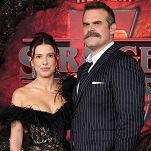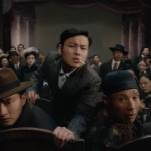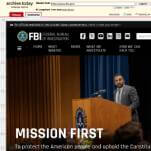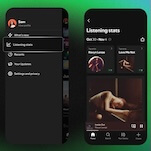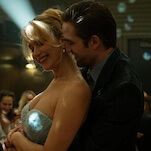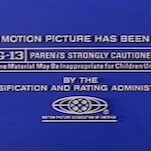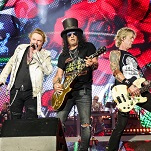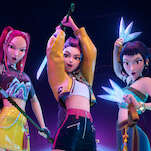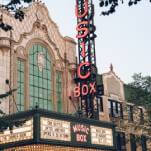The storyline mode re-skins Aerosmith’s Revolution X as an embarrassingly written action comic complete with a dystopia ruled by an overlord called “The Headliner,” who’s bent on outlawing music. Unfortunately, it’s mandatory playing for anyone hoping to unlock anything but the absolute dregs of the game’s 70-plus tracks, which for every Eric Clapton number, includes a couple by Kid Rock and Buckcherry. The story is partly there to justify the interface, which breaks from tradition slightly with the introduction of “mojo orbs,” which indicate the note to be plucked or the chord to be strummed. The scrolling notes are squint-inducing (especially for drums); in tandem with the creepy character models, the game presents a somewhat cheap graphical front.
All is forgiven if the gameplay rocks, though, right? Seven45 Studios is sister company to First Act, the manufacturer of Walmart’s line of guitar-shaped objects, and the much-heralded amp-ready controller is convincingly hefty (though awkwardly weighted), with a pop-up mute for times when actually hearing the strings would be a distraction. Bass guitar isn’t an option in Power Gig, although vocals are handled competently enough. There’s certainly a thrill in the tactile action of playing on real strings, though the game is a bit too forgiving in allowing players to strum anything they like, as long as the frets feel the pressure in the right places. Sometimes that’s harder than it sounds, however, since it’s more difficult to convince the frets closer to the nut to recognize contact.
More realistic or not, it’s a little late in the rhythm-game slugfest for Power Gig to stumble over elements that Rock Band and Guitar Hero get right, like an easily activated overdrive and a reasonably low bar for unlocking new tracks. Couple those concerns with a suspect track list and a substantial buy-in, and Power Gig just doesn’t have the chops to survive in an already-cluttered genre.

